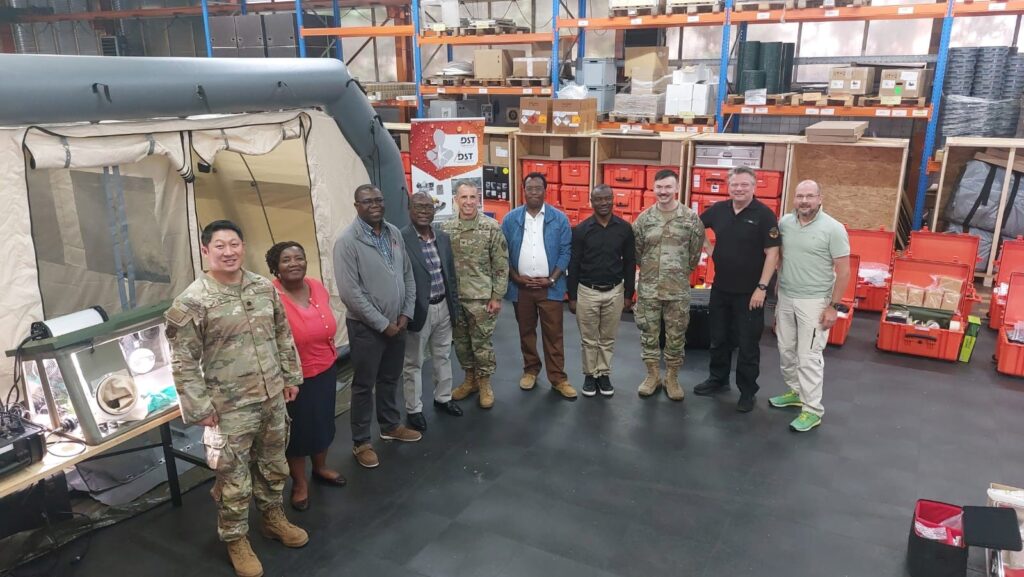Still contending with several significant infectious diseases, including cholera, Ebola and mpox, Southern Africa recently received a “game-changer” in the fight to prevent and contain outbreaks.
As part of a civil-military partnership, Zambia’s National Public Health Institute took delivery of three mobile disease detection laboratories in late September from the United States Africa Command’s (AFRICOM) Office of the Command Surgeon and the U.S. Embassy in Lusaka.
Calling it “a significant boost to regional health security,” the parties said in a September 26 statement that the new facilities and equipment are “poised to modernize infectious disease outbreak response across nine southern African nations — Zambia, the Democratic Republic of the Congo, Angola, Namibia, Botswana, Zimbabwe, Mozambique, Malawi, and Tanzania.”
The labs are expected to dramatically shorten response times and improve the region’s overall capacity to combat potentially devastating outbreaks including viral hemorrhagic fevers such as Ebola, Lassa, Lujo and Marburg viruses, as well as deadly zoonotic infections such as anthrax, brucellosis and avian influenza.
“The ability to rapidly identify and confirm infectious diseases in a safe manner is paramount in preventing widespread outbreaks,” Zambian Ministry of Health Permanent Secretary Dr. Kennedy Lishimpi said. “Previously, we were often playing catch-up, reacting to an outbreak instead of proactively managing it. These advanced mobile labs represent a critical shift in our strategy.”
Widespread armed conflict in eastern DRC has exacerbated the country’s ongoing health crises, prompting neighboring countries Angola, Tanzania and Zambia to step up their disease identification and prevention measures.
The DRC’s Ministry of Public Health declared the country’s 16th Ebola outbreak on September 4 and has linked it to 64 confirmed or probable cases and 43 deaths. Mpox has been endemic to the DRC since the 1970s, but a more transmissible strain spurred a drastic increase in cases beginning in January 2024. The ministry has reported more than 70,000 suspected cases of mpox as of October 14.
Zambia is still grappling with an mpox outbreak that began in October 2024 and has seen more than 1,400 suspected cases and three deaths reported. The disease has spread to all 10 provinces, with the highest number of cases in the capital, Lusaka. Mozambique and Tanzania have dealt with mpox outbreaks in 2025, while Angola and Zimbabwe also have recorded a small number of cases.
AFRICOM Command Surgeon Col. Michael Cohen said the delivery of the three high-tech laboratories to Zambia represents a strategic approach to global health security that equips partner nations to quickly and effectively respond to regional health crises.
“This initiative is about building capacity and is a testament to the importance of multinational partnerships. The work we’ve done over the past several years is a game-changer,” he said. “By investing in the health security of our partners, we not only help them protect their populations and economies, but we also help stop outbreaks before they hit borders.”
The European Union has used mobile labs extensively since 2014’s West Africa Ebola virus outbreak. Designed for rapid deployment, the self-contained labs are fully operational within two hours and are equipped with 20,000 critical items for identifying, treating, and reporting infectious diseases. They also are designed to be self-sufficient for as long as three weeks.
“This capability significantly reduces the time required to obtain critical diagnostic results, with a turnaround time of just one to two days,” the September 26 statement said.
Zambia’s civil-military partnership with AFRICOM also extends to animals and agriculture to support outbreak prevention and mitigation. Like many countries in southern Africa, Zambia is concerned about zoonotic diseases that can spread from animals to humans.
Zambian health institutions collaborated with both AFRICOM and the U.S. Embassy to address national security objectives and crisis response.
“We are pleased to partner with the Zambia National Public Health Institute on this project towards increasing Zambia’s capacity to tackle critical threats to global health security,” said Lt. Col. Matthew Yan, defense attaché for the U.S. Embassy. “The delivery of these mobile infectious disease testing laboratories is a testament to the U.S. government’s continued support to the Zambian government in the health space.”

